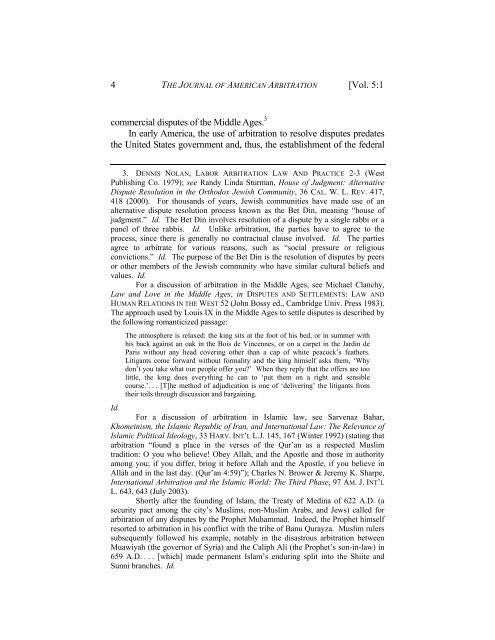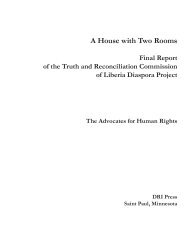2006/Vol. 5 No.1 - Hamline Law - Hamline University
2006/Vol. 5 No.1 - Hamline Law - Hamline University
2006/Vol. 5 No.1 - Hamline Law - Hamline University
You also want an ePaper? Increase the reach of your titles
YUMPU automatically turns print PDFs into web optimized ePapers that Google loves.
4 THE JOURNAL OF AMERICAN ARBITRATION [<strong>Vol</strong>. 5:1<br />
commercial disputes of the Middle Ages. 3<br />
In early America, the use of arbitration to resolve disputes predates<br />
the United States government and, thus, the establishment of the federal<br />
3. DENNIS NOLAN, LABOR ARBITRATION LAW AND PRACTICE 2-3 (West<br />
Publishing Co. 1979); see Randy Linda Sturman, House of Judgment: Alternative<br />
Dispute Resolution in the Orthodox Jewish Community, 36 CAL. W. L. REV. 417,<br />
418 (2000). For thousands of years, Jewish communities have made use of an<br />
alternative dispute resolution process known as the Bet Din, meaning “house of<br />
judgment.” Id. The Bet Din involves resolution of a dispute by a single rabbi or a<br />
panel of three rabbis. Id. Unlike arbitration, the parties have to agree to the<br />
process, since there is generally no contractual clause involved. Id. The parties<br />
agree to arbitrate for various reasons, such as “social pressure or religious<br />
convictions.” Id. The purpose of the Bet Din is the resolution of disputes by peers<br />
or other members of the Jewish community who have similar cultural beliefs and<br />
values. Id.<br />
For a discussion of arbitration in the Middle Ages, see Michael Clanchy,<br />
<strong>Law</strong> and Love in the Middle Ages, in DISPUTES AND SETTLEMENTS: LAW AND<br />
HUMAN RELATIONS IN THE WEST 52 (John Bossy ed., Cambridge Univ. Press 1983).<br />
The approach used by Louis IX in the Middle Ages to settle disputes is described by<br />
the following romanticized passage:<br />
The atmosphere is relaxed: the king sits at the foot of his bed, or in summer with<br />
his back against an oak in the Bois de Vincennes, or on a carpet in the Jardin de<br />
Paris without any head covering other than a cap of white peacock’s feathers.<br />
Litigants come forward without formality and the king himself asks them, ‘Why<br />
don’t you take what our people offer you?’ When they reply that the offers are too<br />
little, the king does everything he can to ‘put them on a right and sensible<br />
course.’. . . [T]he method of adjudication is one of ‘delivering’ the litigants from<br />
their toils through discussion and bargaining.<br />
Id.<br />
For a discussion of arbitration in Islamic law, see Sarvenaz Bahar,<br />
Khomeinism, the Islamic Republic of Iran, and International <strong>Law</strong>: The Relevance of<br />
Islamic Political Ideology, 33 HARV. INT’L L.J. 145, 167 (Winter 1992) (stating that<br />
arbitration “found a place in the verses of the Qur’an as a respected Muslim<br />
tradition: O you who believe! Obey Allah, and the Apostle and those in authority<br />
among you; if you differ, bring it before Allah and the Apostle, if you believe in<br />
Allah and in the last day. (Qur’an 4:59)”); Charles N. Brower & Jeremy K. Sharpe,<br />
International Arbitration and the Islamic World: The Third Phase, 97 AM. J. INT’L<br />
L. 643, 643 (July 2003).<br />
Shortly after the founding of Islam, the Treaty of Medina of 622 A.D. (a<br />
security pact among the city’s Muslims, non-Muslim Arabs, and Jews) called for<br />
arbitration of any disputes by the Prophet Muhammad. Indeed, the Prophet himself<br />
resorted to arbitration in his conflict with the tribe of Banu Qurayza. Muslim rulers<br />
subsequently followed his example, notably in the disastrous arbitration between<br />
Muawiyah (the governor of Syria) and the Caliph Ali (the Prophet’s son-in-law) in<br />
659 A.D. . . . [which] made permanent Islam’s enduring split into the Shiite and<br />
Sunni branches. Id.
















